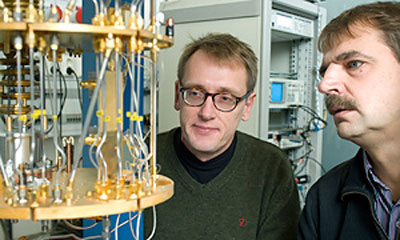 Graphene can enable the best quantum resistance standard. This is one of many advances emerging from the active research into graphene at Chalmers University of Technology. Chalmers will now receive the lion's share of a new Swedish research grant of SEK 40 million for the supermaterial graphene.
Graphene can enable the best quantum resistance standard. This is one of many advances emerging from the active research into graphene at Chalmers University of Technology. Chalmers will now receive the lion's share of a new Swedish research grant of SEK 40 million for the supermaterial graphene.
Nov 8th, 2011
Read more
Silicon Valley's premier program exploring the impact and potential of exponential technologies on the future of health and medicine: Scheduled for February 6-11, 2012.
Nov 8th, 2011
Read more
Researchers with the Lawrence Berkeley National Laboratory have shed light on the role of temperature in controlling a fabrication technique for drawing chemical patterns as small as 20 nanometers.
Nov 7th, 2011
Read more
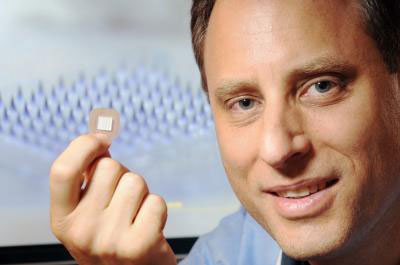 Mark Prausnitz, Regents' professor in Georgia Tech's School of Chemical and Biomolecular Engineering, will pursue an innovative global health research project focused on using microneedle patches for the low-cost administration of polio vaccine through the skin in collaboration with researchers Steve Oberste and Mark Pallansch of the US Centers for Disease Control and Prevention (CDC).
Mark Prausnitz, Regents' professor in Georgia Tech's School of Chemical and Biomolecular Engineering, will pursue an innovative global health research project focused on using microneedle patches for the low-cost administration of polio vaccine through the skin in collaboration with researchers Steve Oberste and Mark Pallansch of the US Centers for Disease Control and Prevention (CDC).
Nov 7th, 2011
Read more
A new generation of lighter, stronger plastics could be produced using an intricate chemical process devised by scientists.
Nov 7th, 2011
Read more
Caltech engineers reveal how scandium trifluoride contracts with heat.
Nov 7th, 2011
Read more
How massless electrons tunnel through energy barriers in a carbon sheet called graphene.
Nov 7th, 2011
Read more
Der Leitfaden 'Nano Textiles' soll Unternehmen der Textil- und Bekleidungsindustrie den sicheren Zu- und Umgang mit der Nanotechnologie erleichtern.
Nov 7th, 2011
Read more
Theoretical research by scientists with the U.S. Department of Energy (DOE)'s Lawrence Berkeley National Laboratory (Berkeley Lab) has led to record-breaking sunlight-to-electricity conversion efficiencies in solar cells. The researchers showed that, contrary to conventional scientific wisdom, the key to boosting solar cell efficiency is not absorbing more photons but emitting more photons.
Nov 7th, 2011
Read more
 Nanotechnology may be an emerging field of study, but it's actually been around for a number of centuries, said Murray Gibson, founding dean of the College of Science at Northeastern University.
Nanotechnology may be an emerging field of study, but it's actually been around for a number of centuries, said Murray Gibson, founding dean of the College of Science at Northeastern University.
Nov 7th, 2011
Read more
Scientists at the University of Nottingham are leading an ambitious research project to develop an in vivo biological cell-equivalent of a computer operating system.
Nov 7th, 2011
Read more
Researchers have made the most complex molecular knot to date.
Nov 7th, 2011
Read more
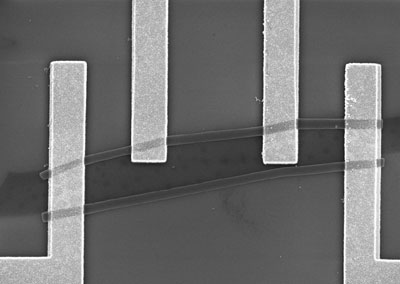 Nanotechnology researchers at the Georgia Institute of Technology have conducted the first direct comparison of two fundamental techniques that could be used for chemically doping sheets of two-dimensional graphene for the fabrication of devices and interconnects.
Nanotechnology researchers at the Georgia Institute of Technology have conducted the first direct comparison of two fundamental techniques that could be used for chemically doping sheets of two-dimensional graphene for the fabrication of devices and interconnects.
Nov 7th, 2011
Read more
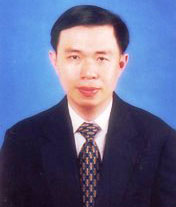 A group of researchers from Thailand investigated the combined effect of adsorption and oxidation for phenolic wastewater treatment using a three phase fluidized bed reactor. The group continuously fed aqueous solutions containing phenol and ozone into a reactor resulting in a comparison of seven cases.
A group of researchers from Thailand investigated the combined effect of adsorption and oxidation for phenolic wastewater treatment using a three phase fluidized bed reactor. The group continuously fed aqueous solutions containing phenol and ozone into a reactor resulting in a comparison of seven cases.
Nov 7th, 2011
Read more
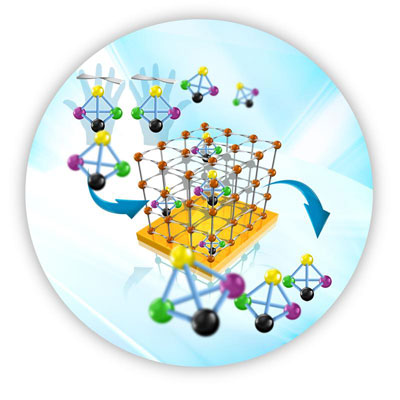 Ein flexibles und effizientes neues Verfahren zur Trennung von Enantiomeren haben Forscher des Karlsruher Instituts fuer Technologie (KIT) und der Ruhr-Uni Bochum (RUB) entwickelt. Die Enantiomerentrennung ist unerlaesslich fuer die Herstellung vieler Medikamente.
Ein flexibles und effizientes neues Verfahren zur Trennung von Enantiomeren haben Forscher des Karlsruher Instituts fuer Technologie (KIT) und der Ruhr-Uni Bochum (RUB) entwickelt. Die Enantiomerentrennung ist unerlaesslich fuer die Herstellung vieler Medikamente.
Nov 7th, 2011
Read more
SAFENANO and the Institute of Occupational Medicine announce the launch of MARINA - one of the largest projects addressing nanotechnology risk issues to date.
Nov 7th, 2011
Read more
 Graphene can enable the best quantum resistance standard. This is one of many advances emerging from the active research into graphene at Chalmers University of Technology. Chalmers will now receive the lion's share of a new Swedish research grant of SEK 40 million for the supermaterial graphene.
Graphene can enable the best quantum resistance standard. This is one of many advances emerging from the active research into graphene at Chalmers University of Technology. Chalmers will now receive the lion's share of a new Swedish research grant of SEK 40 million for the supermaterial graphene.





 Subscribe to our Nanotechnology News feed
Subscribe to our Nanotechnology News feed